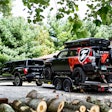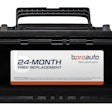In part two of Propane fleet, Roush CleanTech President Todd Mouw addresses his company’s recent deal with Schwan’s Home Services, one of its largest autogas contracts yet, and answers questions about the autogas market, including how it stacks up against the growing heavy-duty EV segment.
HWT: First, congratulations on the Schwan’s deal. Does this rank as one of the largest propane fleet acquisitions conducted through Roush CleanTech?
Mouw: Yes, this is one of the largest commercial fleet deals we have closed in the last 3 to 4 years. It is exciting to see major fleets recognize the benefits of propane autogas and adopt in large volumes versus just dipping their toe in the water several years ago. The business case for propane autogas is strong and the total cost of ownership presents a huge advantage.
HWT: Will Schwan’s hold two separate warranties for their vehicles? One from Ford and one from Roush CleanTech?
Mouw: Yes, that is the way the Ford QVM (Qualified Vehicle Modifier) program works. As a fleet orders vehicles with the gaseous prep engine package and work with a Ford QVM gaseous fuel system supplier such as Roush CleanTech, the base Ford warranty remains intact and then we warrant any of the fuel system/emission system components we modify. It is a very seamless process as we have more than 300 service locations around the country that can do both base Ford repairs as well as repairs on Roush CleanTech fuel system technology.
HWT: How will the conversions be handled?
Mouw: All of the propane fuel system installations are being done on ship-thru via Roush CleanTech at our location in Livonia, Michigan.
HWT: Briefly describe how fueling infrastructure was/is/will be addressed to accommodate such a large uptick in propane vehicles at Schwan’s.
Mouw: I will let Schwan’s talk more about this, but they have been a leader in alternative fuels adoption, specifically propane, since the early 1970’s. The majority of their depots already have propane fueling infrastructure in place.
For fleets that do not already have pre-existing infrastructure, the process is relatively simple. The majority of propane companies in the United States will install a fueling site(s) for little to no cost in exchange for a fuel contract. That is one of the huge advantages to propane; the infrastructure question is a simple one to answer.
HWT: Why has propane proven so appealing for Schwan’s?
Mouw: They are a leader in this area as they were one of the earliest adopters of propane in their fleet. The leadership of Schwan’s struggled with delivering product to their customers in the early 1970’s due to the oil embargo, so they decided to take control and switch their fleet to propane autogas so they could effectively serve their customers. Like many fleets, they see the value in this lower priced, cleaner and domestically produced energy source.
HWT: Were there any incentives available to help defray vehicle costs for Schwan’s?
Mouw: I will defer to Schwan’s on this one. Separate from Schwan’s we have more than 1,200 fleet customers around the country, and the beauty of propane is that most of those adoptions occurred without much subsidy as the business case driven by reduced fuel and maintenance costs stood on its own.
Today we only ask for a level playing field in regards to incentives. Either everyone can benefit or the technology should stand on its own.
HWT: What advice would you give to fleets that are thinking of adding propane vehicles to their fleets?
Mouw: Talk with your OEM, talk with your peers that have adopted propane or other alternative energy technology and make sure your technology partner has the financial and technical capability to support you for the next 15 to 20 years with service parts, superior service and continued innovation.
HWT: EVs have, of course, been getting a lot of headlines recently, yours included. How do propane and electric compare in terms of medium and heavy-duty applications?
Mouw: Both have emerged as leaders in helping fleets displace diesel but at this point propane is much further along since the technology can stand on its own with limited subsidy. EVs will become mainstream in the next 7 to 10 years, but in the Class 4-7 space there is work to be done on several fronts: the integration of the technology and controls strategy needs to improve; the battery cost must continue to come down; infrastructure needs must be addressed; service locations must be identified and more OEM involvement must occur so companies like Roush CleanTech can help develop the supply chain and make it capable of supporting much larger volumes.
HWT: Do you anticipate more fleets opting for propane this year? If so, why?
Mouw: Yes. We are seeing more and more interest from commercial and public fleets around the country. We have more than 1,200 customers with 500 million miles of data so interested fleets can tap into a robust database of experience to show how significant the cost savings will be for their organization. As diesel prices continue to rise, as VW funding hits the streets and as diesel technology continues to get more complex, fleets will look for an easy, cleaner and more cost-effective solution to manage their fleet. Propane answers the call.
HWT: What’s been a traditional barrier(s) preventing fleets from acquiring a propane vehicle and how has Roush CleanTech allayed that/those concern(s)?
Mouw: Human nature has an aversion to change. Doing something different or new causes organizations to pause so they look for reasons to stick with the status quo. The fact that we have such a large base of fleets that can share their experience is certainly shortening the sales cycle for our team. The usual stumbling blocks such as range, infrastructure, service, training, total cost of ownership and safety all can be addressed very efficiently with propane autogas.










